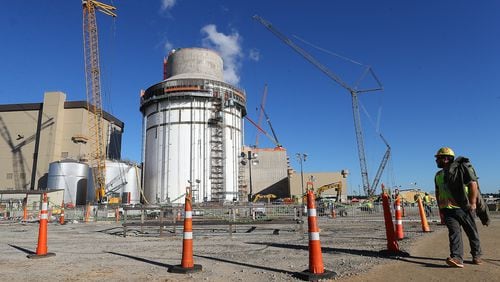Years of delays and billions in cost overruns have led the owner of the second-largest stake in the Plant Vogtle nuclear expansion to move to freeze the construction costs it is obligated to pay for the project.
Over the weekend, Oglethorpe Power — a membership-based cooperative that serves electric utilities in metro Atlanta and across the state — pulled a release valve to exercise a one-time option to cap the construction costs it will have to pay for Vogtle Units 3 and 4 at $8.1 billion.
In exchange, Oglethorpe will give up 2 percentage points of its stake in the project, dropping its ownership from 30% to 28%. Georgia Power — which owns the largest share of the project — would see its stake increase from 45.7% to 47.7% as a result of the move, but may have to shoulder Oglethorpe’s portion of any future cost increases.
Oglethorpe Power’s president and CEO Michael Smith said in a release that his cooperative is committed to completing Vogtle Units 3 and 4, but that action was needed to shield its members and their customers from the project’s rising costs.
“Oglethorpe Power and our member cooperatives are deeply invested in the success of these nuclear units that will provide emission-free energy for Georgians for the next 60-80 years,” Smith said. “At the same time, we feel responsible for protecting our not-for-profit member cooperatives and their consumers. Our decision to freeze protects EMC (electric membership corporation) energy consumers who can least afford increases in their electricity rates, especially in today’s economy.”
The agreement that affords Oglethorpe Power the chance to avoid exposure to future Vogtle cost increases was negotiated in 2018. It allows each of the project’s co-owners, other than Georgia Power, to freeze their capital investment if shareable costs for the project exceed $2.1 billion.
Since late 2018, the project has been delayed five times and shareable costs have climbed to $3.4 billion, Oglethorpe Power says.
Georgia Power, meanwhile, indicated it disputes whether the triggers necessary to allow Oglethorpe’s move have been reached.
“As we have previously disclosed, Georgia Power Company and Oglethorpe Power have a difference of opinion regarding whether the conditions for tender have been satisfied,” Georgia Power spokesman Jacob Hawkins said in a statement. “We are reviewing Oglethorpe Power’s letter and will respond in accordance with the agreements between the parties.”
Vogtle Units 3 and 4 are being built near two existing units south of Augusta and would be the first new commercial nuclear reactors built in the United States in roughly three decades.
The two units were first greenlit in 2009 and were originally expected to start generating electricity in 2017.
But roughly five years after their expected completion date, both units are still under construction. And according to calculations by the Associated Press, Plant Vogtle’s total costs have ballooned to over $30 billion, more than double the $14 billion initial cost estimate.
Hawkins said Unit 3 is now projected to be online by late 2022 or early 2023, while Unit 4 is expected to start providing electricity by the third or fourth quarter of 2023.
Nuclear proponents say new and existing reactors can provide huge amounts of low-carbon energy, at a time when scientists say the world economy desperately needs to stop burning fossil fuels and rein in greenhouse gas emissions, which are warming the planet.
On the other hand, detractors point to the steep costs and lengthy delays that have plagued recent projects, as well as safety concerns around the reactors themselves and the waste they produce.
The Municipal Electric Authority of Georgia (MEAG Power), which owns a 22.7% stake in Vogtle’s new units, did not respond to a request for comment.
Kay Phillips, a spokeswoman for Dalton Utilities, which holds a 1.6% ownership in the Vogtle project, said the company is reviewing the new developments.
About the Author







